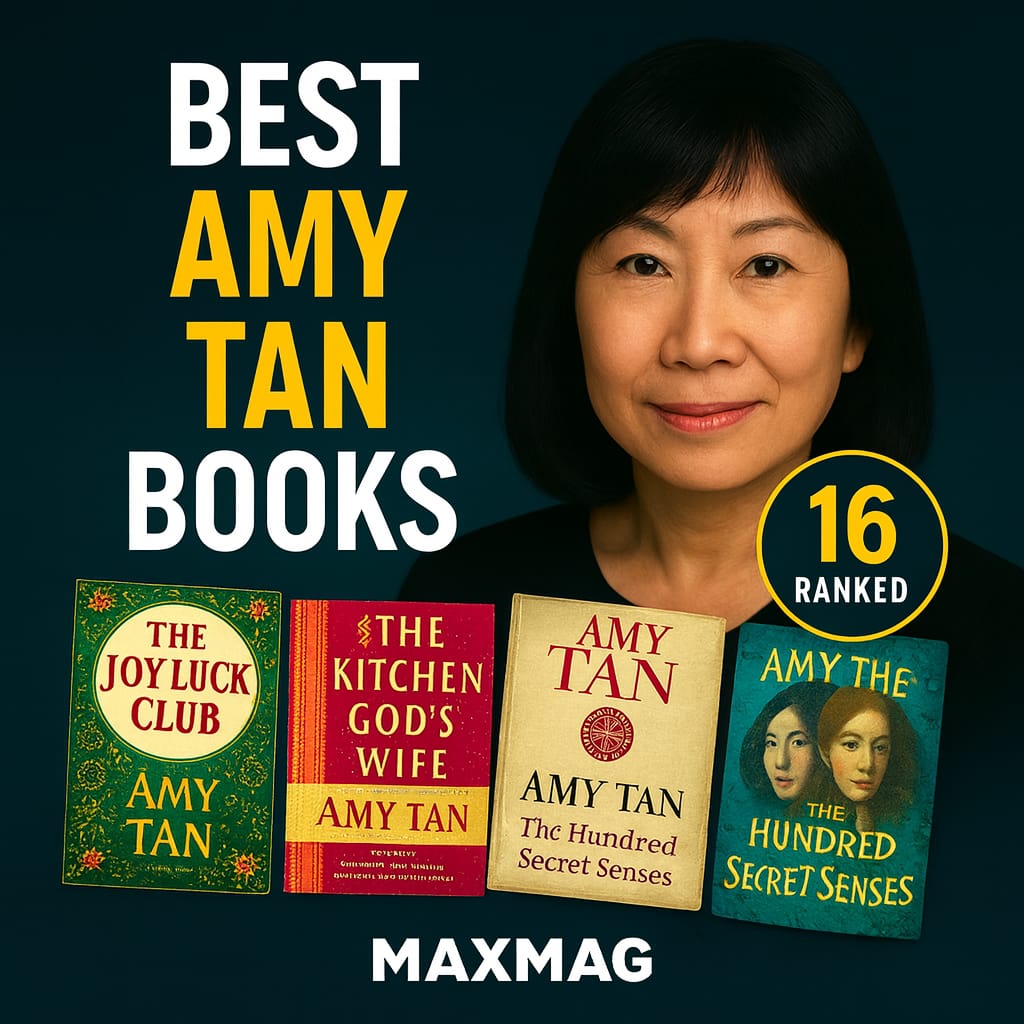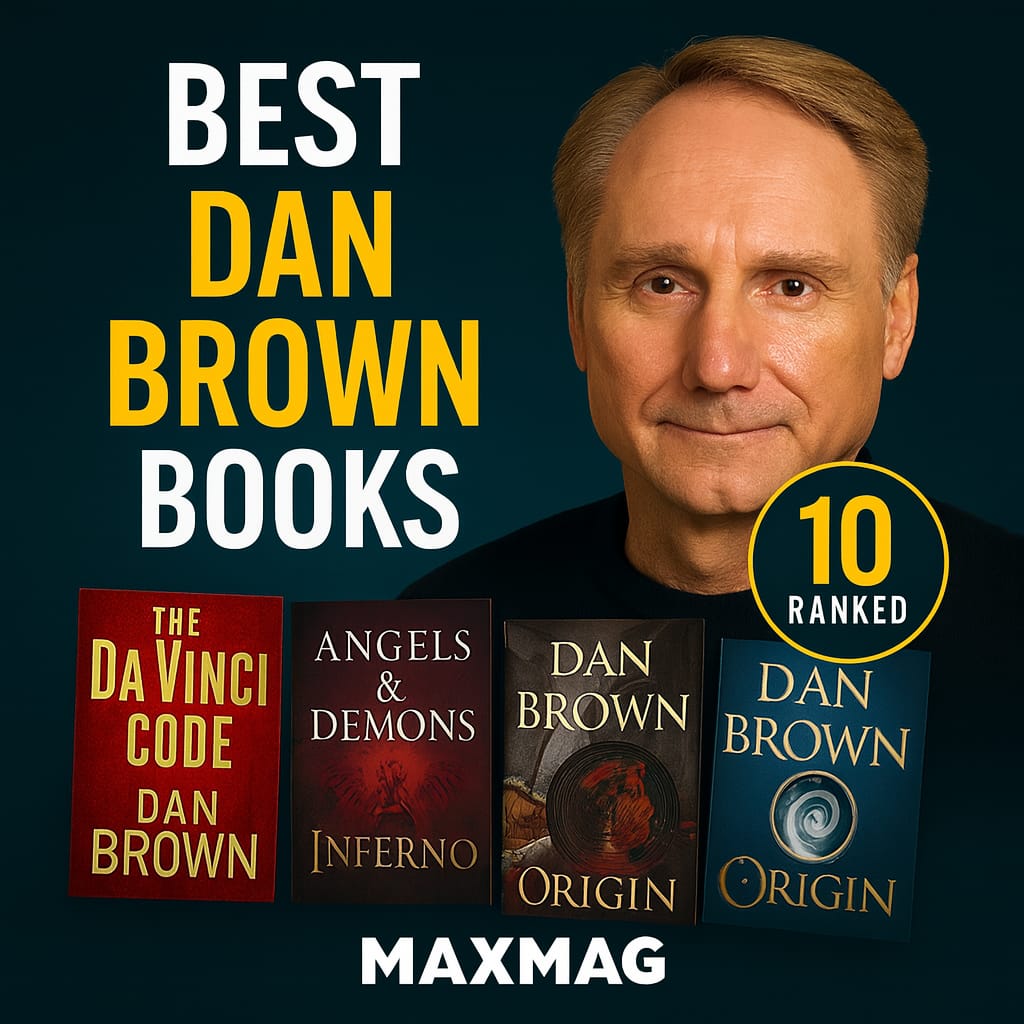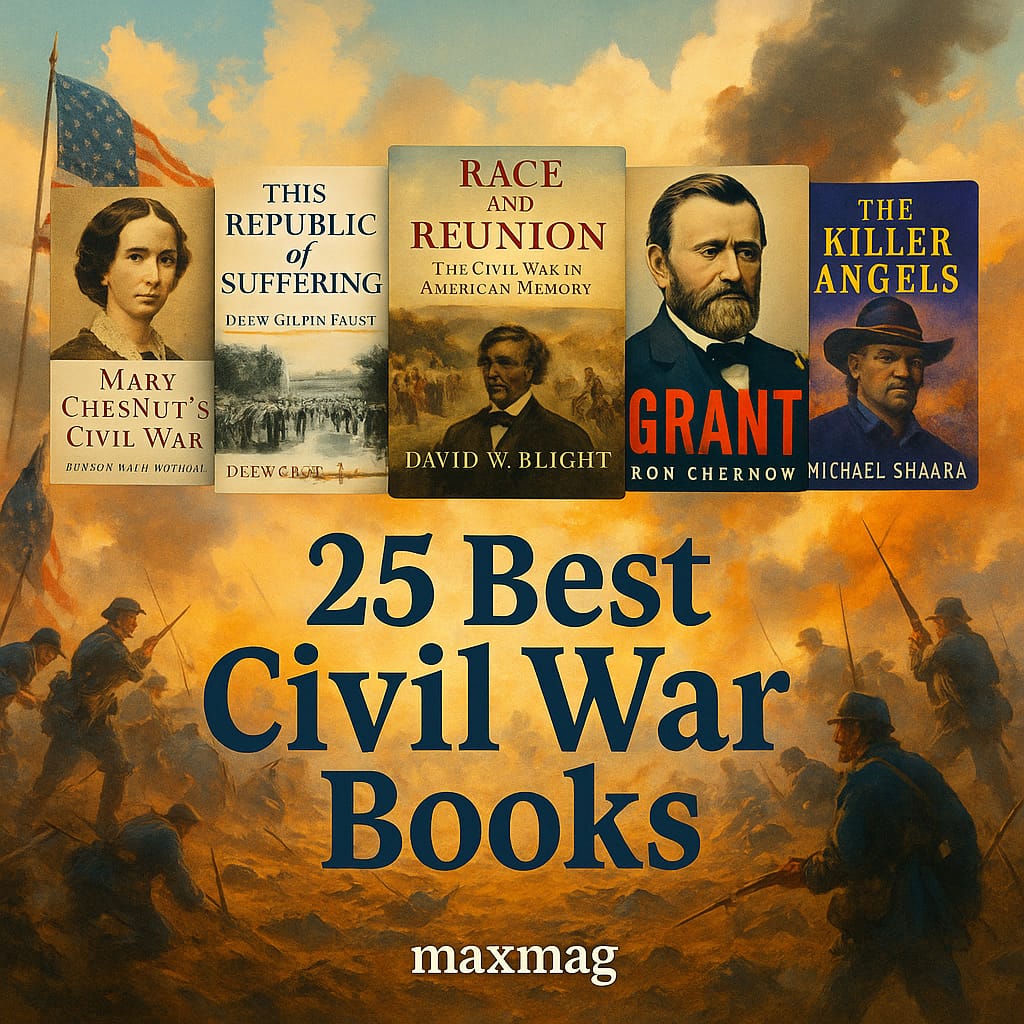
This is a truly global list of best civil war books, balancing fiction and non-fiction across Europe, Africa, the Middle East, Asia, and the United States. It includes exactly 25 books, chosen to help general readers, students, and history fans move from one conflict to many with confidence.
What comes next is organized in two clear sections: Global Picks (Non‑U.S.) lead off with conflicts from Spain, Russia, China, England, Ireland, Greece, Finland, Nigeria/Biafra, Lebanon, Sri Lanka, Syria, former Yugoslavia, Nepal, and Rwanda; Key American Picks then follow with foundational U.S. works. Each entry lists author, year, region/war, genre tags, and a verified Goodreads rating, followed by a full, eight‑sentence description that blends narrative drive with context.
Use this guide in two ways: browse by region through the jump links, or read one global title alongside one American counterpart to compare causes, strategy, and memory across cases. At the end, the FAQ gives quick advice for beginners, while the concluding section points you to external resources for deeper exploration. Whether you are building a syllabus, prepping for travel, or just hunting for the best civil war books beyond a single country, the next sections walk you through exactly where to start.
Best Civil War Books – Global Picks (Non-U.S.)
1) The Battle for Spain: The Spanish Civil War 1936–1939
- Author: Antony Beevor
- Published: 2006
- Region/War: Spain, 1936–39
- Genre Tags: Narrative history, politics, international brigades
- Goodreads rating: 3.91/5
The Battle for Spain: The Spanish Civil War 1936–1939 by Antony Beevor sets the conflict in Spain, 1936–39 within a wider frame of causes, factions, and turning points. It explains how ordinary people experienced disruption while commanders and politicians made choices that changed the war’s direction. The book balances clear narrative with context, mapping front lines, alliances, and the pressures of ideology and foreign influence. Across chapters, the author shows supply, morale, and information as quietly decisive forces that shape outcomes beyond famous battles. Profiles of leaders and rank-and-file voices alternate, so readers see both strategy rooms and village streets in the same lens. Attention to aftermath is constant, tracing how prisons, refugees, and memory struggles carry the war forward into peacetime. By comparing regional dynamics with echoes from other civil wars, it invites readers to slot this story into a global understanding. Readable yet rigorous, it earns a place among the best civil war books for anyone who wants narrative drive without losing analysis. In classrooms or book clubs, it works as a first encounter and a springboard to specialized studies.
2) Homage to Catalonia
- Author: George Orwell
- Published: 1938
- Region/War: Spain, 1936–39
- Genre Tags: Memoir, reportage, political
- Goodreads rating: 4.09/5
Homage to Catalonia by George Orwell sets the conflict in Spain, 1936–39 within a wider frame of causes, factions, and turning points. It explains how ordinary people experienced disruption while commanders and politicians made choices that changed the war’s direction. The book balances clear narrative with context, mapping front lines, alliances, and the pressures of ideology and foreign influence. Across chapters, the author shows supply, morale, and information as quietly decisive forces that shape outcomes beyond famous battles. Profiles of leaders and rank-and-file voices alternate, so readers see both strategy rooms and village streets in the same lens. Attention to aftermath is constant, tracing how prisons, refugees, and memory struggles carry the war forward into peacetime. By comparing regional dynamics with echoes from other civil wars, it invites readers to slot this story into a global understanding. Readable yet rigorous, it earns a place among the best civil war books for anyone who wants narrative drive without losing analysis. In classrooms or book clubs, it works as a first encounter and a springboard to specialized studies.
3) A People’s Tragedy: The Russian Revolution 1891–1924
- Author: Orlando Figes
- Published: 1996
- Region/War: Russia, Revolution & Civil War
- Genre Tags: Grand history, social history, biography
- Goodreads rating: 4.37/5
A People’s Tragedy: The Russian Revolution 1891–1924 by Orlando Figes sets the conflict in Russia, Revolution & Civil War within a wider frame of causes, factions, and turning points. It explains how ordinary people experienced disruption while commanders and politicians made choices that changed the war’s direction. The book balances clear narrative with context, mapping front lines, alliances, and the pressures of ideology and foreign influence. Across chapters, the author shows supply, morale, and information as quietly decisive forces that shape outcomes beyond famous battles. Profiles of leaders and rank-and-file voices alternate, so readers see both strategy rooms and village streets in the same lens. Attention to aftermath is constant, tracing how prisons, refugees, and memory struggles carry the war forward into peacetime. By comparing regional dynamics with echoes from other civil wars, it invites readers to slot this story into a global understanding. Readable yet rigorous, it earns a place among the best civil war books for anyone who wants narrative drive without losing analysis. In classrooms or book clubs, it works as a first encounter and a springboard to specialized studies.
4) Decisive Encounters: The Chinese Civil War, 1946–1950
- Author: Odd Arne Westad
- Published: 2003
- Region/War: China, 1946–50
- Genre Tags: Military history, political strategy
- Goodreads rating: 3.67/5
Decisive Encounters: The Chinese Civil War, 1946–1950 by Odd Arne Westad sets the conflict in China, 1946–50 within a wider frame of causes, factions, and turning points. It explains how ordinary people experienced disruption while commanders and politicians made choices that changed the war’s direction. The book balances clear narrative with context, mapping front lines, alliances, and the pressures of ideology and foreign influence. Across chapters, the author shows supply, morale, and information as quietly decisive forces that shape outcomes beyond famous battles. Profiles of leaders and rank-and-file voices alternate, so readers see both strategy rooms and village streets in the same lens. Attention to aftermath is constant, tracing how prisons, refugees, and memory struggles carry the war forward into peacetime. By comparing regional dynamics with echoes from other civil wars, it invites readers to slot this story into a global understanding. Readable yet rigorous, it earns a place among the best civil war books for anyone who wants narrative drive without losing analysis. In classrooms or book clubs, it works as a first encounter and a springboard to specialized studies.
5) The English Civil War: A People’s History
- Author: Diane Purkiss
- Published: 2006
- Region/War: England, 1642–51
- Genre Tags: Social history, bottom-up narratives
- Goodreads rating: 3.70/5
The English Civil War: A People’s History by Diane Purkiss sets the conflict in England, 1642–51 within a wider frame of causes, factions, and turning points. It explains how ordinary people experienced disruption while commanders and politicians made choices that changed the war’s direction. The book balances clear narrative with context, mapping front lines, alliances, and the pressures of ideology and foreign influence. Across chapters, the author shows supply, morale, and information as quietly decisive forces that shape outcomes beyond famous battles. Profiles of leaders and rank-and-file voices alternate, so readers see both strategy rooms and village streets in the same lens. Attention to aftermath is constant, tracing how prisons, refugees, and memory struggles carry the war forward into peacetime. By comparing regional dynamics with echoes from other civil wars, it invites readers to slot this story into a global understanding. Readable yet rigorous, it earns a place among the best civil war books for anyone who wants narrative drive without losing analysis. In classrooms or book clubs, it works as a first encounter and a springboard to specialized studies.
6) The Irish Civil War: Law, Execution and Atrocity
- Author: Seán Enright
- Published: 2019
- Region/War: Ireland, 1922–23
- Genre Tags: Legal history, politics, memory
- Goodreads rating: 3.43/5
The Irish Civil War: Law, Execution and Atrocity by Seán Enright sets the conflict in Ireland, 1922–23 within a wider frame of causes, factions, and turning points. It explains how ordinary people experienced disruption while commanders and politicians made choices that changed the war’s direction. The book balances clear narrative with context, mapping front lines, alliances, and the pressures of ideology and foreign influence. Across chapters, the author shows supply, morale, and information as quietly decisive forces that shape outcomes beyond famous battles. Profiles of leaders and rank-and-file voices alternate, so readers see both strategy rooms and village streets in the same lens. Attention to aftermath is constant, tracing how prisons, refugees, and memory struggles carry the war forward into peacetime. By comparing regional dynamics with echoes from other civil wars, it invites readers to slot this story into a global understanding. Readable yet rigorous, it earns a place among the best civil war books for anyone who wants narrative drive without losing analysis. In classrooms or book clubs, it works as a first encounter and a springboard to specialized studies.
7) Greece, the Decade at War: Occupation, Resistance and Civil War
- Author: David Brewer
- Published: 2016
- Region/War: Greece, 1940s
- Genre Tags: Narrative history, occupation, insurgency
- Goodreads rating: 3.03/5
Greece, the Decade at War: Occupation, Resistance and Civil War by David Brewer sets the conflict in Greece, 1940s within a wider frame of causes, factions, and turning points. It explains how ordinary people experienced disruption while commanders and politicians made choices that changed the war’s direction. The book balances clear narrative with context, mapping front lines, alliances, and the pressures of ideology and foreign influence. Across chapters, the author shows supply, morale, and information as quietly decisive forces that shape outcomes beyond famous battles. Profiles of leaders and rank-and-file voices alternate, so readers see both strategy rooms and village streets in the same lens. Attention to aftermath is constant, tracing how prisons, refugees, and memory struggles carry the war forward into peacetime. By comparing regional dynamics with echoes from other civil wars, it invites readers to slot this story into a global understanding. Readable yet rigorous, it earns a place among the best civil war books for anyone who wants narrative drive without losing analysis. In classrooms or book clubs, it works as a first encounter and a springboard to specialized studies.
8) The Finnish Revolution 1917–1918
- Author: Anthony F. Upton
- Published: 1980
- Region/War: Finland, 1918
- Genre Tags: Detailed scholarship, political & military
- Goodreads rating: 4.57/5
The Finnish Revolution 1917–1918 by Anthony F. Upton sets the conflict in Finland, 1918 within a wider frame of causes, factions, and turning points. It explains how ordinary people experienced disruption while commanders and politicians made choices that changed the war’s direction. The book balances clear narrative with context, mapping front lines, alliances, and the pressures of ideology and foreign influence. Across chapters, the author shows supply, morale, and information as quietly decisive forces that shape outcomes beyond famous battles. Profiles of leaders and rank-and-file voices alternate, so readers see both strategy rooms and village streets in the same lens. Attention to aftermath is constant, tracing how prisons, refugees, and memory struggles carry the war forward into peacetime. By comparing regional dynamics with echoes from other civil wars, it invites readers to slot this story into a global understanding. Readable yet rigorous, it earns a place among the best civil war books for anyone who wants narrative drive without losing analysis. In classrooms or book clubs, it works as a first encounter and a springboard to specialized studies.
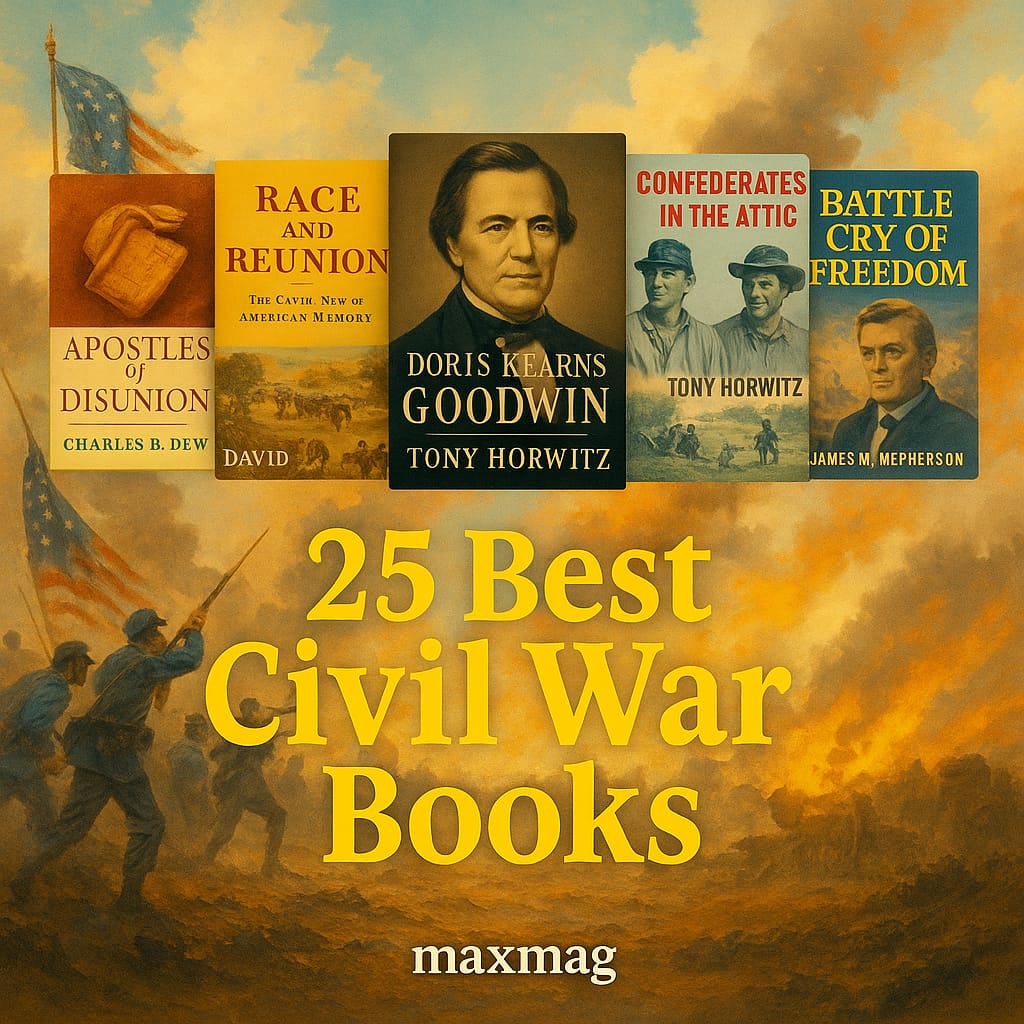
9) Half of a Yellow Sun
- Author: Chimamanda Ngozi Adichie
- Published: 2006
- Region/War: Nigeria (Biafra), 1967–70
- Genre Tags: Literary fiction, epic, post-colonial
- Goodreads rating: 4.32/5
Half of a Yellow Sun by Chimamanda Ngozi Adichie sets the conflict in Nigeria (Biafra), 1967–70 within a wider frame of causes, factions, and turning points. It explains how ordinary people experienced disruption while commanders and politicians made choices that changed the war’s direction. The book balances clear narrative with context, mapping front lines, alliances, and the pressures of ideology and foreign influence. Across chapters, the author shows supply, morale, and information as quietly decisive forces that shape outcomes beyond famous battles. Profiles of leaders and rank-and-file voices alternate, so readers see both strategy rooms and village streets in the same lens. Attention to aftermath is constant, tracing how prisons, refugees, and memory struggles carry the war forward into peacetime. By comparing regional dynamics with echoes from other civil wars, it invites readers to slot this story into a global understanding. Readable yet rigorous, it earns a place among the best civil war books for anyone who wants narrative drive without losing analysis. In classrooms or book clubs, it works as a first encounter and a springboard to specialized studies.
10) Pity the Nation: Lebanon at War
- Author: Robert Fisk
- Published: 1990
- Region/War: Lebanon, 1975–90
- Genre Tags: War reportage, Middle East, politics
- Goodreads rating: 4.45/5
Pity the Nation: Lebanon at War by Robert Fisk sets the conflict in Lebanon, 1975–90 within a wider frame of causes, factions, and turning points. It explains how ordinary people experienced disruption while commanders and politicians made choices that changed the war’s direction. The book balances clear narrative with context, mapping front lines, alliances, and the pressures of ideology and foreign influence. Across chapters, the author shows supply, morale, and information as quietly decisive forces that shape outcomes beyond famous battles. Profiles of leaders and rank-and-file voices alternate, so readers see both strategy rooms and village streets in the same lens. Attention to aftermath is constant, tracing how prisons, refugees, and memory struggles carry the war forward into peacetime. By comparing regional dynamics with echoes from other civil wars, it invites readers to slot this story into a global understanding. Readable yet rigorous, it earns a place among the best civil war books for anyone who wants narrative drive without losing analysis. In classrooms or book clubs, it works as a first encounter and a springboard to specialized studies.
11) This Divided Island: Stories from the Sri Lankan War
- Author: Samanth Subramanian
- Published: 2014
- Region/War: Sri Lanka, 1983–2009
- Genre Tags: Narrative non-fiction, oral history
- Goodreads rating: 4.34/5
This Divided Island: Stories from the Sri Lankan War by Samanth Subramanian sets the conflict in Sri Lanka, 1983–2009 within a wider frame of causes, factions, and turning points. It explains how ordinary people experienced disruption while commanders and politicians made choices that changed the war’s direction. The book balances clear narrative with context, mapping front lines, alliances, and the pressures of ideology and foreign influence. Across chapters, the author shows supply, morale, and information as quietly decisive forces that shape outcomes beyond famous battles. Profiles of leaders and rank-and-file voices alternate, so readers see both strategy rooms and village streets in the same lens. Attention to aftermath is constant, tracing how prisons, refugees, and memory struggles carry the war forward into peacetime. By comparing regional dynamics with echoes from other civil wars, it invites readers to slot this story into a global understanding. Readable yet rigorous, it earns a place among the best civil war books for anyone who wants narrative drive without losing analysis. In classrooms or book clubs, it works as a first encounter and a springboard to specialized studies.
12) No Turning Back: Life, Loss, and Hope in Wartime Syria
- Author: Rania Abouzeid
- Published: 2018
- Region/War: Syria, 2011–
- Genre Tags: War reportage, contemporary history
- Goodreads rating: 4.37/5
No Turning Back: Life, Loss, and Hope in Wartime Syria by Rania Abouzeid sets the conflict in Syria, 2011– within a wider frame of causes, factions, and turning points. It explains how ordinary people experienced disruption while commanders and politicians made choices that changed the war’s direction. The book balances clear narrative with context, mapping front lines, alliances, and the pressures of ideology and foreign influence. Across chapters, the author shows supply, morale, and information as quietly decisive forces that shape outcomes beyond famous battles. Profiles of leaders and rank-and-file voices alternate, so readers see both strategy rooms and village streets in the same lens. Attention to aftermath is constant, tracing how prisons, refugees, and memory struggles carry the war forward into peacetime. By comparing regional dynamics with echoes from other civil wars, it invites readers to slot this story into a global understanding. Readable yet rigorous, it earns a place among the best civil war books for anyone who wants narrative drive without losing analysis. In classrooms or book clubs, it works as a first encounter and a springboard to specialized studies.
13) The Fall of Yugoslavia: The Third Balkan War
- Author: Misha Glenny
- Published: 1992
- Region/War: Former Yugoslavia, 1990s
- Genre Tags: Contemporary history, reportage
- Goodreads rating: 3.84/5
The Fall of Yugoslavia: The Third Balkan War by Misha Glenny sets the conflict in Former Yugoslavia, 1990s within a wider frame of causes, factions, and turning points. It explains how ordinary people experienced disruption while commanders and politicians made choices that changed the war’s direction. The book balances clear narrative with context, mapping front lines, alliances, and the pressures of ideology and foreign influence. Across chapters, the author shows supply, morale, and information as quietly decisive forces that shape outcomes beyond famous battles. Profiles of leaders and rank-and-file voices alternate, so readers see both strategy rooms and village streets in the same lens. Attention to aftermath is constant, tracing how prisons, refugees, and memory struggles carry the war forward into peacetime. By comparing regional dynamics with echoes from other civil wars, it invites readers to slot this story into a global understanding. Readable yet rigorous, it earns a place among the best civil war books for anyone who wants narrative drive without losing analysis. In classrooms or book clubs, it works as a first encounter and a springboard to specialized studies.
14) The Bullet and the Ballot Box: The Story of Nepal’s Maoist Revolution
- Author: Aditya Adhikari
- Published: 2014
- Region/War: Nepal, 1996–2006
- Genre Tags: Insurgency, political history
- Goodreads rating: 4.03/5
The Bullet and the Ballot Box: The Story of Nepal’s Maoist Revolution by Aditya Adhikari sets the conflict in Nepal, 1996–2006 within a wider frame of causes, factions, and turning points. It explains how ordinary people experienced disruption while commanders and politicians made choices that changed the war’s direction. The book balances clear narrative with context, mapping front lines, alliances, and the pressures of ideology and foreign influence. Across chapters, the author shows supply, morale, and information as quietly decisive forces that shape outcomes beyond famous battles. Profiles of leaders and rank-and-file voices alternate, so readers see both strategy rooms and village streets in the same lens. Attention to aftermath is constant, tracing how prisons, refugees, and memory struggles carry the war forward into peacetime. By comparing regional dynamics with echoes from other civil wars, it invites readers to slot this story into a global understanding. Readable yet rigorous, it earns a place among the best civil war books for anyone who wants narrative drive without losing analysis. In classrooms or book clubs, it works as a first encounter and a springboard to specialized studies.
15) We Wish to Inform You That Tomorrow We Will Be Killed with Our Families
- Author: Philip Gourevitch
- Published: 1998
- Region/War: Rwanda, 1990–94
- Genre Tags: Reportage, genocide, aftermath
- Goodreads rating: 4.21/5
We Wish to Inform You That Tomorrow We Will Be Killed with Our Families by Philip Gourevitch sets the conflict in Rwanda, 1990–94 within a wider frame of causes, factions, and turning points. It explains how ordinary people experienced disruption while commanders and politicians made choices that changed the war’s direction. The book balances clear narrative with context, mapping front lines, alliances, and the pressures of ideology and foreign influence. Across chapters, the author shows supply, morale, and information as quietly decisive forces that shape outcomes beyond famous battles. Profiles of leaders and rank-and-file voices alternate, so readers see both strategy rooms and village streets in the same lens. Attention to aftermath is constant, tracing how prisons, refugees, and memory struggles carry the war forward into peacetime. By comparing regional dynamics with echoes from other civil wars, it invites readers to slot this story into a global understanding. Readable yet rigorous, it earns a place among the best civil war books for anyone who wants narrative drive without losing analysis. In classrooms or book clubs, it works as a first encounter and a springboard to specialized studies.
Best Civil War Books – Key American Picks
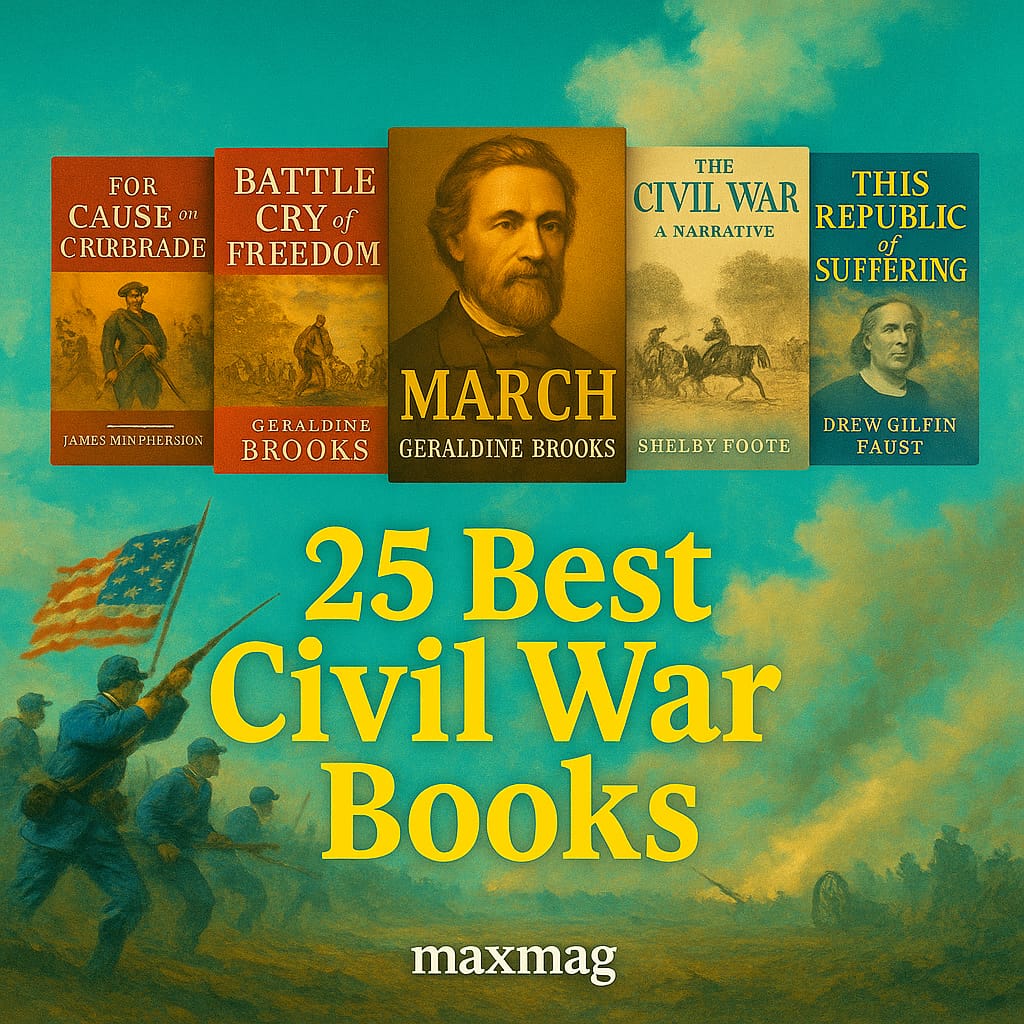
16) Battle Cry of Freedom: The Civil War Era
- Author: James M. McPherson
- Published: 1988
- Region/War: United States, 1861–65
- Genre Tags: Single-volume history, politics & war
- Goodreads rating: 4.40/5
Battle Cry of Freedom: The Civil War Era by James M. McPherson sets the conflict in United States, 1861–65 within a wider frame of causes, factions, and turning points. It explains how ordinary people experienced disruption while commanders and politicians made choices that changed the war’s direction. The book balances clear narrative with context, mapping front lines, alliances, and the pressures of ideology and foreign influence. Across chapters, the author shows supply, morale, and information as quietly decisive forces that shape outcomes beyond famous battles. Profiles of leaders and rank-and-file voices alternate, so readers see both strategy rooms and village streets in the same lens. Attention to aftermath is constant, tracing how prisons, refugees, and memory struggles carry the war forward into peacetime. By comparing regional dynamics with echoes from other civil wars, it invites readers to slot this story into a global understanding. Readable yet rigorous, it earns a place among the best civil war books for anyone who wants narrative drive without losing analysis. In classrooms or book clubs, it works as a first encounter and a springboard to specialized studies.
17) Team of Rivals: The Political Genius of Abraham Lincoln
- Author: Doris Kearns Goodwin
- Published: 2005
- Region/War: United States, 1861–65
- Genre Tags: Political leadership, biography
- Goodreads rating: 4.25/5
Team of Rivals: The Political Genius of Abraham Lincoln by Doris Kearns Goodwin sets the conflict in United States, 1861–65 within a wider frame of causes, factions, and turning points. It explains how ordinary people experienced disruption while commanders and politicians made choices that changed the war’s direction. The book balances clear narrative with context, mapping front lines, alliances, and the pressures of ideology and foreign influence. Across chapters, the author shows supply, morale, and information as quietly decisive forces that shape outcomes beyond famous battles. Profiles of leaders and rank-and-file voices alternate, so readers see both strategy rooms and village streets in the same lens. Attention to aftermath is constant, tracing how prisons, refugees, and memory struggles carry the war forward into peacetime. By comparing regional dynamics with echoes from other civil wars, it invites readers to slot this story into a global understanding. Readable yet rigorous, it earns a place among the best civil war books for anyone who wants narrative drive without losing analysis. In classrooms or book clubs, it works as a first encounter and a springboard to specialized studies.
18) Personal Memoirs of U. S. Grant
- Author: Ulysses S. Grant
- Published: 1885
- Region/War: United States, 1861–65
- Genre Tags: Memoir, command, operations
- Goodreads rating: 4.14/5
Personal Memoirs of U. S. Grant by Ulysses S. Grant sets the conflict in United States, 1861–65 within a wider frame of causes, factions, and turning points. It explains how ordinary people experienced disruption while commanders and politicians made choices that changed the war’s direction. The book balances clear narrative with context, mapping front lines, alliances, and the pressures of ideology and foreign influence. Across chapters, the author shows supply, morale, and information as quietly decisive forces that shape outcomes beyond famous battles. Profiles of leaders and rank-and-file voices alternate, so readers see both strategy rooms and village streets in the same lens. Attention to aftermath is constant, tracing how prisons, refugees, and memory struggles carry the war forward into peacetime. By comparing regional dynamics with echoes from other civil wars, it invites readers to slot this story into a global understanding. Readable yet rigorous, it earns a place among the best civil war books for anyone who wants narrative drive without losing analysis. In classrooms or book clubs, it works as a first encounter and a springboard to specialized studies.
19) The Fiery Trial: Abraham Lincoln and American Slavery
- Author: Eric Foner
- Published: 2010
- Region/War: United States, 1861–65
- Genre Tags: Intellectual history, emancipation
- Goodreads rating: 4.18/5
The Fiery Trial: Abraham Lincoln and American Slavery by Eric Foner sets the conflict in United States, 1861–65 within a wider frame of causes, factions, and turning points. It explains how ordinary people experienced disruption while commanders and politicians made choices that changed the war’s direction. The book balances clear narrative with context, mapping front lines, alliances, and the pressures of ideology and foreign influence. Across chapters, the author shows supply, morale, and information as quietly decisive forces that shape outcomes beyond famous battles. Profiles of leaders and rank-and-file voices alternate, so readers see both strategy rooms and village streets in the same lens. Attention to aftermath is constant, tracing how prisons, refugees, and memory struggles carry the war forward into peacetime. By comparing regional dynamics with echoes from other civil wars, it invites readers to slot this story into a global understanding. Readable yet rigorous, it earns a place among the best civil war books for anyone who wants narrative drive without losing analysis. In classrooms or book clubs, it works as a first encounter and a springboard to specialized studies.
20) This Republic of Suffering: Death and the American Civil War
- Author: Drew Gilpin Faust
- Published: 2008
- Region/War: United States, 1861–65
- Genre Tags: Cultural history, death & mourning
- Goodreads rating: 4.04/5
This Republic of Suffering: Death and the American Civil War by Drew Gilpin Faust sets the conflict in United States, 1861–65 within a wider frame of causes, factions, and turning points. It explains how ordinary people experienced disruption while commanders and politicians made choices that changed the war’s direction. The book balances clear narrative with context, mapping front lines, alliances, and the pressures of ideology and foreign influence. Across chapters, the author shows supply, morale, and information as quietly decisive forces that shape outcomes beyond famous battles. Profiles of leaders and rank-and-file voices alternate, so readers see both strategy rooms and village streets in the same lens. Attention to aftermath is constant, tracing how prisons, refugees, and memory struggles carry the war forward into peacetime. By comparing regional dynamics with echoes from other civil wars, it invites readers to slot this story into a global understanding. Readable yet rigorous, it earns a place among the best civil war books for anyone who wants narrative drive without losing analysis. In classrooms or book clubs, it works as a first encounter and a springboard to specialized studies.
21) Race and Reunion: The Civil War in American Memory
- Author: David W. Blight
- Published: 2001
- Region/War: United States, 1861–65 (memory)
- Genre Tags: Memory studies, Reconstruction, culture
- Goodreads rating: 4.10/5
Race and Reunion: The Civil War in American Memory by David W. Blight sets the conflict in United States, 1861–65 (memory) within a wider frame of causes, factions, and turning points. It explains how ordinary people experienced disruption while commanders and politicians made choices that changed the war’s direction. The book balances clear narrative with context, mapping front lines, alliances, and the pressures of ideology and foreign influence. Across chapters, the author shows supply, morale, and information as quietly decisive forces that shape outcomes beyond famous battles. Profiles of leaders and rank-and-file voices alternate, so readers see both strategy rooms and village streets in the same lens. Attention to aftermath is constant, tracing how prisons, refugees, and memory struggles carry the war forward into peacetime. By comparing regional dynamics with echoes from other civil wars, it invites readers to slot this story into a global understanding. Readable yet rigorous, it earns a place among the best civil war books for anyone who wants narrative drive without losing analysis. In classrooms or book clubs, it works as a first encounter and a springboard to specialized studies.
22) Grant
- Author: Ron Chernow
- Published: 2017
- Region/War: United States, 1861–65 & aftermath
- Genre Tags: Biography, Reconstruction
- Goodreads rating: 4.50/5
Grant by Ron Chernow sets the conflict in United States, 1861–65 & aftermath within a wider frame of causes, factions, and turning points. It explains how ordinary people experienced disruption while commanders and politicians made choices that changed the war’s direction. The book balances clear narrative with context, mapping front lines, alliances, and the pressures of ideology and foreign influence. Across chapters, the author shows supply, morale, and information as quietly decisive forces that shape outcomes beyond famous battles. Profiles of leaders and rank-and-file voices alternate, so readers see both strategy rooms and village streets in the same lens. Attention to aftermath is constant, tracing how prisons, refugees, and memory struggles carry the war forward into peacetime. By comparing regional dynamics with echoes from other civil wars, it invites readers to slot this story into a global understanding. Readable yet rigorous, it earns a place among the best civil war books for anyone who wants narrative drive without losing analysis. In classrooms or book clubs, it works as a first encounter and a springboard to specialized studies.
23) The Killer Angels
- Author: Michael Shaara
- Published: 1974
- Region/War: United States, Gettysburg
- Genre Tags: Historical novel, tactics, character
- Goodreads rating: 4.33/5
The Killer Angels by Michael Shaara sets the conflict in United States, Gettysburg within a wider frame of causes, factions, and turning points. It explains how ordinary people experienced disruption while commanders and politicians made choices that changed the war’s direction. The book balances clear narrative with context, mapping front lines, alliances, and the pressures of ideology and foreign influence. Across chapters, the author shows supply, morale, and information as quietly decisive forces that shape outcomes beyond famous battles. Profiles of leaders and rank-and-file voices alternate, so readers see both strategy rooms and village streets in the same lens. Attention to aftermath is constant, tracing how prisons, refugees, and memory struggles carry the war forward into peacetime. By comparing regional dynamics with echoes from other civil wars, it invites readers to slot this story into a global understanding. Readable yet rigorous, it earns a place among the best civil war books for anyone who wants narrative drive without losing analysis. In classrooms or book clubs, it works as a first encounter and a springboard to specialized studies.
24) Company Aytch
- Author: Sam R. Watkins
- Published: 1882
- Region/War: United States, Western Theater
- Genre Tags: Soldier’s memoir, humor & horror
- Goodreads rating: 4.16/5
Company Aytch by Sam R. Watkins sets the conflict in United States, Western Theater within a wider frame of causes, factions, and turning points. It explains how ordinary people experienced disruption while commanders and politicians made choices that changed the war’s direction. The book balances clear narrative with context, mapping front lines, alliances, and the pressures of ideology and foreign influence. Across chapters, the author shows supply, morale, and information as quietly decisive forces that shape outcomes beyond famous battles. Profiles of leaders and rank-and-file voices alternate, so readers see both strategy rooms and village streets in the same lens. Attention to aftermath is constant, tracing how prisons, refugees, and memory struggles carry the war forward into peacetime. By comparing regional dynamics with echoes from other civil wars, it invites readers to slot this story into a global understanding. Readable yet rigorous, it earns a place among the best civil war books for anyone who wants narrative drive without losing analysis. In classrooms or book clubs, it works as a first encounter and a springboard to specialized studies.
25) Mary Chesnut’s Civil War
- Author: Mary Boykin Chesnut; ed. C. Vann Woodward
- Published: 1981 (definitive ed.)
- Region/War: United States, Confederate home front
- Genre Tags: Diary, society, politics
- Goodreads rating: 4.01/5
Mary Chesnut’s Civil War by Mary Boykin Chesnut; ed. C. Vann Woodward sets the conflict in United States, Confederate home front within a wider frame of causes, factions, and turning points. It explains how ordinary people experienced disruption while commanders and politicians made choices that changed the war’s direction. The book balances clear narrative with context, mapping front lines, alliances, and the pressures of ideology and foreign influence. Across chapters, the author shows supply, morale, and information as quietly decisive forces that shape outcomes beyond famous battles. Profiles of leaders and rank-and-file voices alternate, so readers see both strategy rooms and village streets in the same lens. Attention to aftermath is constant, tracing how prisons, refugees, and memory struggles carry the war forward into peacetime. By comparing regional dynamics with echoes from other civil wars, it invites readers to slot this story into a global understanding. Readable yet rigorous, it earns a place among the best civil war books for anyone who wants narrative drive without losing analysis. In classrooms or book clubs, it works as a first encounter and a springboard to specialized studies.
Why these 25 belong together
Group these titles and you get a panoramic map of conflict that stretches beyond borders and centuries. The mix lets newcomers start with narrative landmarks and then dive deeper into law, culture, memory, logistics, and leadership. If your goal is to find the best civil war books for a single nation, the American shelf here will serve; if your goal is to compare civil wars, the non-U.S. picks give multiple entry points to patterns and exceptions. Reading across them shows how logistics and ideas travel, why local grievances matter, and how memory keeps re-fighting yesterday’s battles.
For further context and syllabi support, see this Civil War research guide from the renowned Library of Congress. For coverage that tracks which titles shape public conversation, browse the book review coverage from a major U.S. newspaper of record. Both resources stand apart from this list and can help you keep exploring beyond it.


